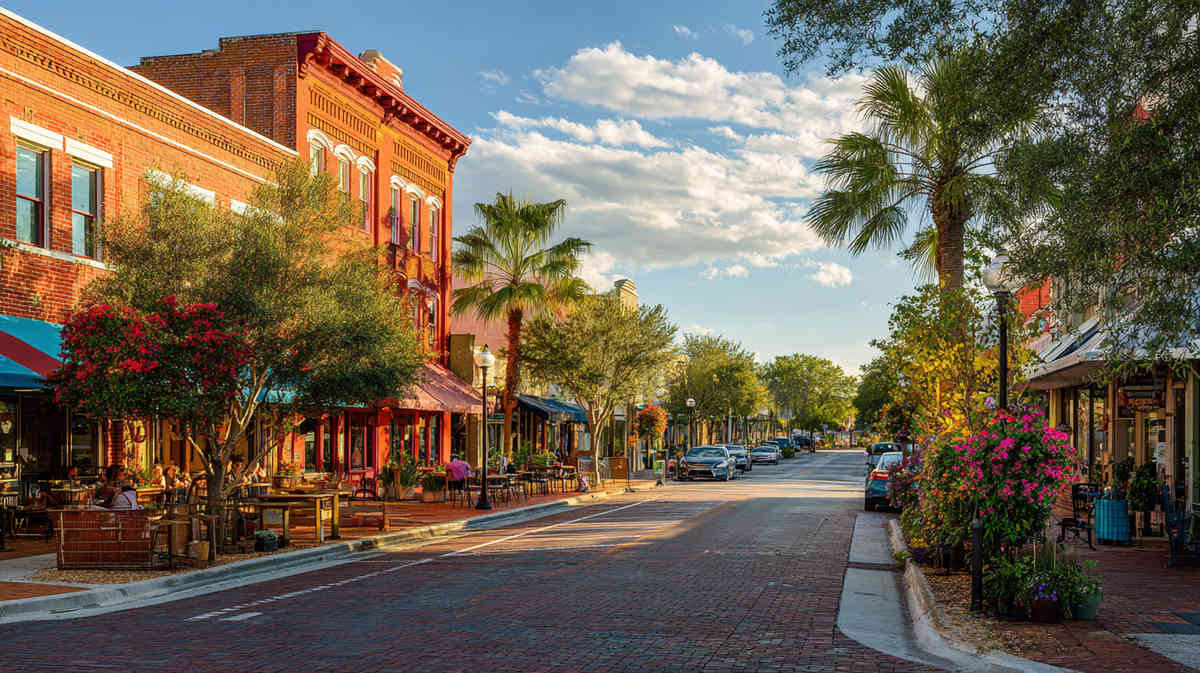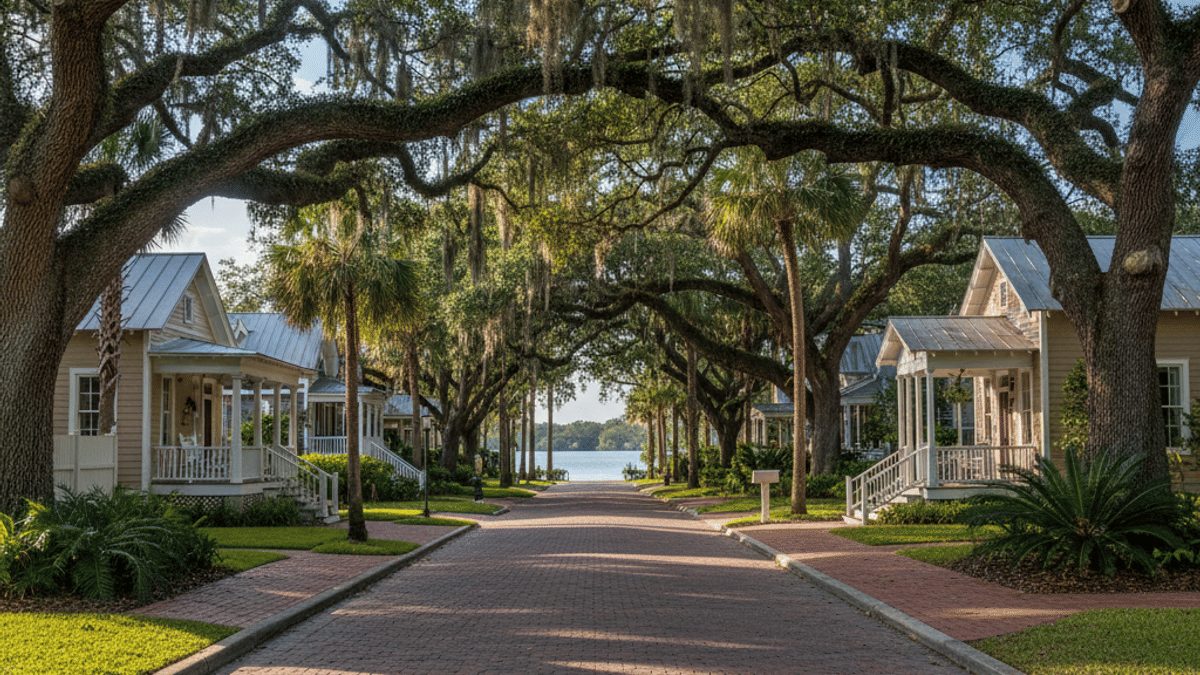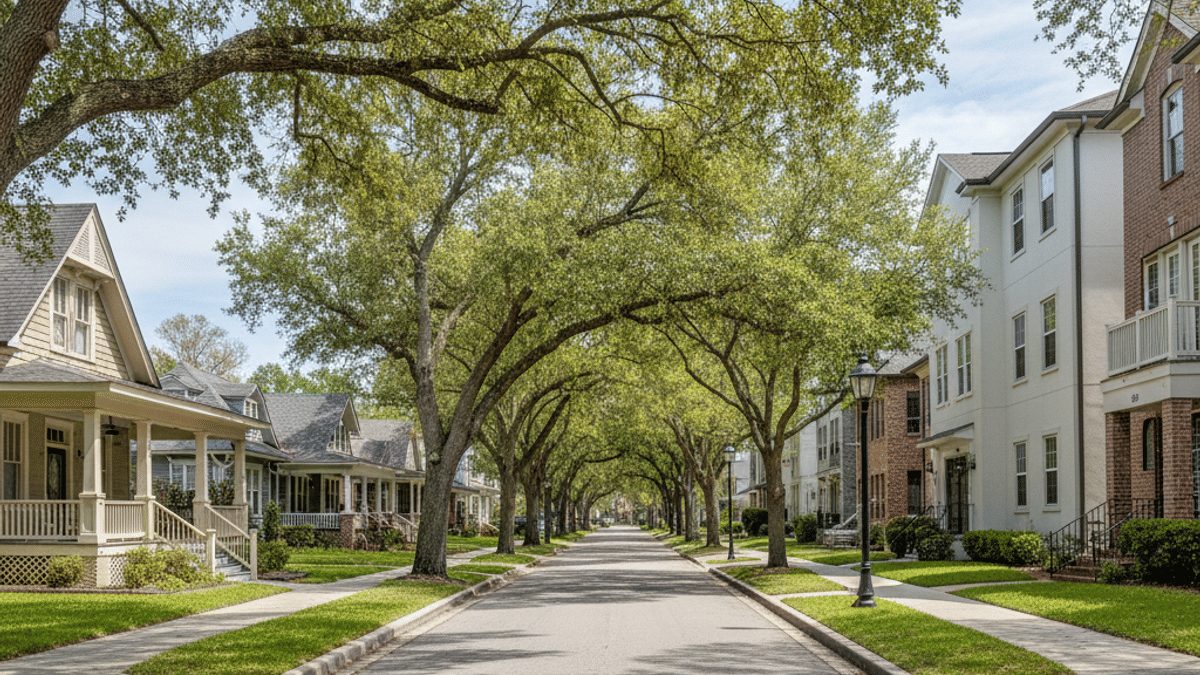Quick Take on Winter Garden
You can drive west from downtown Orlando for about twenty minutes, cross the Stoneybrook Parkway, and suddenly the skyscrapers melt into brick storefronts and citrus trees. That is Winter Garden. The city clock reads roughly 51,000 residents this year, up almost ten percent since 2020. Builders keep breaking ground because people keep showing up. Median sale price hovers near $540,000, with new-construction pushing the average even higher on the south side of town. Inventory sits at roughly two and a half months, a tell-tale sign that sellers still have the upper hand, though price growth cooled to four percent year over year. Net migration points inward. In plain English, more folks arrive than leave, and they are grabbing single-family homes as fast as the listings hit the feed.
Why People Rave About Winter Garden (Pros)
You feel it the moment you hit Plant Street. Music spills from the patio at Axum, the Saturday market smells like kettle corn, and strangers say hello as if that is the most normal thing in the world. Community, not just a word on a brochure, lives here.
• Downtown that stays busy after dark
Old railroad warehouses became the Garden Theatre, craft breweries, and a comic-book store. Live jazz on Friday, open-air films on Sunday. Homeowners living within a mile of the brick arch often ditch the car for a golf cart. Try doing that in most Florida suburbs.
• The West Orange Trail
Twenty-two miles of paved path slices through the city. Runners hit it at dawn, cyclists in colorful spandex roll by at noon, and strollers filled with iced coffee appear after work. The trail is free exercise and free therapy in one straight line.
• Lake culture without the tourist chaos
Johns Lake and Lake Apopka frame the north and south. Weekends mean paddleboards, bass boats, and dock parties. Yet you rarely fight the crowds you see at the giant resort-lakes east of I-4. Water access is public in spots, private in others, but always five-minutes away.
• Schools that show up on statewide leaderboards
The local high school earned an “A” grade for eight straight years. Two magnet academies funnel students into robotics or performing arts. Advanced Placement pass rates land north of seventy percent, according to last spring’s district report. Hard numbers, not just word-of-mouth.
• Food grown here, not shipped in
Southern Hill Farms, five miles outside the city line, invites residents to pick blueberries and sunflowers. A half-acre micro-farm behind MoonCricket Grille supplies the restaurant with herbs. Hyper-local produce shortens the distance from vine to plate and tastes the part.
• Job access minus the brutal commute
You are on the edge of Orlando’s tech corridor and within reach of Disney’s upcoming Lake Nona campus via State Road 429. Average door-to-door time is thirty-five minutes in rush hour, which sounds rough until you compare it with I-4 gridlock on the east side of the metro.
• Festivals that refuse to feel manufactured
The Winter Garden Blues & BBQ bash started as a neighborhood cookout. It is still free to attend, and the pit-masters still compete for bragging rights more than trophies. Residents volunteer, bands play under string lights, kids chalk the sidewalks. The vibe is “small town” even with thousands in attendance.
Is life perfect? Of course not. Yet day-to-day living puts you close to nature, good food, and familiar faces. That cocktail keeps drawing newcomers.
What Might Make You Pause (Cons)
Now the other side of the coin. Anyone can post dreamy drone footage. You need the fine print no one puts on Zillow.
• Price tags that surprise first-time buyers
Five years back you could find a three-bed ranch for under $300k. Today, that same square footage lists in the mid-$400s, sometimes higher if it sits near Horizon West. Property taxes rose along with valuations, so escrow accounts feel the squeeze. Saving up a twenty-percent down payment hurts more now than at any time in the past decade.
• Insurance headaches unique to Central Florida
Hurricanes do not hit every season, yet actuarial tables plan for the worst. Home-insurance premiums grew almost thirty percent statewide since 2022, and Winter Garden did not dodge that trend. Some carriers left Florida entirely, forcing homeowners to hunt for coverage through Citizens or niche underwriters. Budget for that before you tour open houses.
• Traffic that creeps, then leaps
Two state roads and one toll road funnel commuters toward Orlando. One fender-bender near the Turnpike clogs everything. A thirty-minute drive morphs into an hour without warning. Public buses run on the edges of town, though frequency drops after sunset. Rideshares fill part of the gap but surge-pricing stings during events.
• Summer humidity that feels like a sauna
June through September delivers ninety-degree highs with humidity in the high seventies. Step outside at 2 PM and your shirt sticks to you. Locals adapt by running errands before noon and cranking air-conditioning. If your hair frizzes in mild wet weather, brace yourself.
• Critters of every shape
Yes, gators. They prefer ponds, and local wildlife officers patrol the hot spots, yet they exist. Fire ants love fresh sod, palmetto bugs sneak indoors when it rains, and anhingas occasionally perch on backyard docks and leave, let us say, messy calling cards. Florida life means sharing space with nature.
• Tour-spill from the theme parks
Winter Garden markets itself as “authentic Main Street” to visitors tired of hotel corridors. That strategy pumps money into local shops, yet the weekend influx crowds coffee lines and soaks up parking. Locals learn to shop early on Saturday then retreat until the afternoon.
• Limited land left inside city limits
Builders solved the shortage by cramming large houses onto narrow lots, especially south of Fowler Grove. You might own a four-bed beauty but look straight into the neighbor’s bonus room. Anyone craving acreage must search farther west toward Clermont or pay premium prices inside gated enclaves.
None of these downsides are deal breakers for every buyer, though they can sting if you arrive unprepared. Better to meet them head-on than pretend they are not there.
Final Thoughts Before You Pack
We just sprinted through the sunlight and the shadows. On the plus side: thriving downtown, lake life, respected schools, room to work and play. On the minus side: higher purchase costs, sticky summers, and the occasional gator cameo. Most residents decide the perks outweigh the pain, which explains the steady population climb. Your calculus may differ. Visit twice, once in February and once in August. Check insurance quotes, test-drive the commute, walk the trail at dawn. If Winter Garden still feels right after that mini-experiment, you will know.
FAQs About Moving to Winter Garden
1. How much do homes really cost right now?
Median closed price landed near $540,000 in early 2025, though condos start in the high $300s and lakefront estates cross seven figures. Prices shift quarterly, so pull fresh comps before making an offer.
2. Does the city flood during hurricanes?
Elevations here sit higher than many Orlando suburbs. Streets can pond after a cloudburst, yet widespread flooding is uncommon. Still, flood insurance is encouraged near lakes or canals.
3. Are there job opportunities inside Winter Garden itself?
Health-care clinics, logistics hubs near the 429 corridor, and a growing cluster of software start-ups employ locals. Many residents still commute to Orlando hospitals, theme-park offices, and Lake Nona medical research centers.
4. What is the vibe after dark?
Plant Street stays busy until about 11 PM on weekends thanks to live music and wine bars. Outside downtown, the scene is quiet. If you crave late-night clubs, downtown Orlando is your playground.
5. How long does it take to reach the beach?
Cocoa Beach is roughly ninety minutes east, Clearwater about two hours west. Weekday mornings you can beat those times, holiday weekends you will not.
6. Are new neighborhoods still coming?
Yes. Horizon West, just south of city limits, plans thousands more rooftops plus office park acreage through 2028. Expect fresh grocery anchors, restaurants, and wider roads as part of the build-out.
7. Is there public transit expansion on the horizon?
The SunRail commuter line has eyed a western extension, though funding remains up in the air. For now, buses and toll roads are the backbone. Keep an eye on Orange County’s transportation penny referendum for future updates.
Choose wisely, plan thoroughly, and you could end up calling Winter Garden home for a very long stretch.





